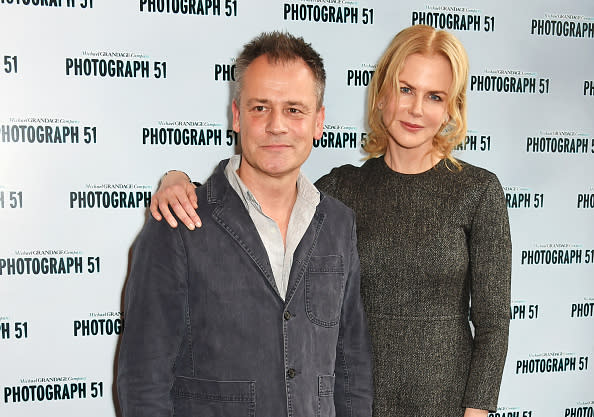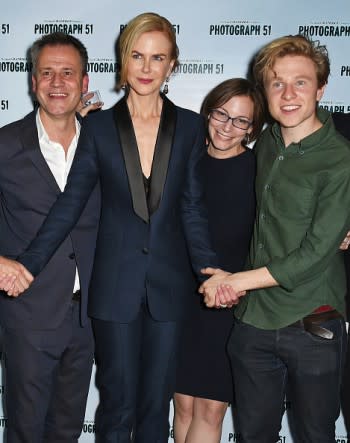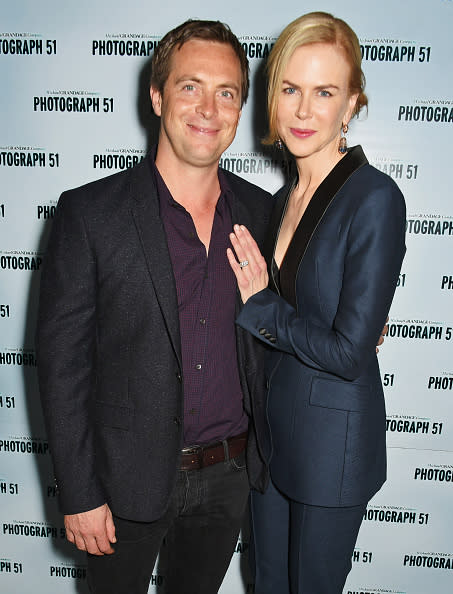Michael Grandage & James Bierman On Bringing Nicole Kidman Back To The Stage, Previews And ‘Genius’: Deadline Q&A

EXCLUSIVE: It’s been 17 years since Nicole Kidman last took to the stage, in Sam Mendes’ staging of David Hare’s The Blue Room at London’s Donmar Warehouse and later on Broadway. So Monday’s opening of Photograph 51 at the Noel Coward Theatre marks a rare event and has London’s theatre community abuzz. The reviews will be in later today, but the critics have, at least, stayed away from breaking the preview window embargo, as some did last month when Benedict Cumberbatch opened in Hamlet across the city at the Barbican.
Kidman is in safe hands with the play’s director, Michael Grandage, the former artistic director of the Donmar (he took over from Mendes in 2002 and stayed in the job for a decade). With producer James Bierman, he now runs the Michael Grandage Company, which in 2013 presented its first season of plays starring the likes of Jude Law, Judi Dench and Daniel Radcliffe. Grandage directed Kidman in his feature film debut, Genius, also starring Law and Colin Firth, which is set for a 2016 release.
Anna Zeigler’s Photograph 51 is making its UK premiere with Grandage’s production. Kidman plays Rosalind Franklin, the woman responsible for the first clear X-ray photograph of a strand of DNA. It’s a corrective: Franklin’s work was appropriated by Francis Crick and James Watson, who built on data she’d gathered to publish a DNA model that fundamentally changed the way we understood the building blocks of life. Franklin’s contribution – at a time when women were a rare commodity in science – went largely unrecognized.

Ahead of opening night, Deadline met with Grandage and Bierman to discuss Kidman’s return to the West End. In a small side room backstage at the Noel Coward in between matinee and evening previews, the pair expounded on Kidman’s curiously specific love for the London stage, the Hamlet preview brouhaha and the vast differences between the West End and Broadway.
DEADLINE: The reviews are out tonight. Given the first preview reviews of Hamlet a few weeks ago, are you relieved they haven’t come through any sooner?
GRANDAGE: This notion in the press that it’s OK to break embargoes is so ridiculous. We need to know how audiences are going to react, and to know if we might need to move a line or a scene or do some additional dramaturgical work. Every preview is constantly evolving until we’re ready to give it over to the critics. The reason it’s so important is that, once this show closes in a few months, there will only be a few photographs and the reviews left to remember it. It’s important to me that the critics sit down and see a show that has been honed to a point we’re all happy with. And if it gets one- or two-star reviews, at least I’ll know we tried. Whereas if you’re reviewing a preview, you suspect they might always have been one- or two-star reviews. And I’m a big fan of the critics, because I think it’s an essential part of the theatre ecology.
DEADLINE: How has Nicole Kidman taken to returning to the stage?
GRANDAGE: She hasn’t done stage in 17 years, but certain things are muscles, like the vocal demands of filling a 950-seat theater. Nobody can be expected to walk off the street and just do that. It’s a muscle in training and she’s got hers back for this, I think, quite quickly. She used the rehearsal process to get match fit, and that’s an interesting way to do it because I think some people treat rehearsals and the stage itself as two separate things. She’s pretty remarkable, but it’s not by fluke. It’s by an applied, serious approach.
DEADLINE: When did this conversation begin?
GRANDAGE: I was in New York when she called. I was ready with my I want to work with you speech and a set of ideas for plays. I suggested some Tennessee Williams and some Ibsen. I thought The Lady From The Sea might be a very good play for her. But after talking it through, she was clear she wanted to do a new play.
DEADLINE: How did you alight on Photograph 51?

BIERMAN:
Photograph 51 came when I was in New York, doing my trawl of the agents. Anna had written a play called Dov And Ali, which one of our assistant directors at the Donmar had directed in 2009, and her agent told me about Photograph 51. What was curious was it had been done in Washington, and two of our donors at the Donmar had seen that production. At the same time, they’d had breakfast with Michael and tipped him off to the play.
GRANDAGE: We read this and liked it, is the point. And we knew we’d probably want to do it in England, partly because it’s a very English play.
DEADLINE: Had those conversations with Nicole always been about doing a play on the West End?
GRANDAGE: Curiously, she did have a desire to do it in London. Before she did The Blue Room she was in London working on the Kubrick movie, Eyes Wide Shut, and she was here for years. Tom Cruise was on set every day, but Nicole had a ton of time off and she filled it by going endlessly to the theater. She made friends with the theater community. People like [writer] Patrick Marber and Sam Mendes. That was how The Blue Room evolved. I hadn’t appreciated how deep her love for the West End went.
DEADLINE: How different are the West End and Broadway worlds in your experience?
GRANDAGE: The audiences make it different. When we did Frost/Nixon, it was extraordinary. Here, everyone was backing David Frost. But no one in America really knew who he was, and it was all a play about their late President. The balance has to be redefined on Broadway.
BIERMAN: When we did Cripple Of Inishmaan with Daniel Radcliffe, the cast were discombobulated in the Broadway previews, because there were laughs in places there had been gasps. But the most striking similarity is the strength of the community in both London and New York.
GRANDAGE: Broadway is much more commercially minded. And Broadway is, effectively, built around the Tony Awards. We have prize-givings in the West End, but ultimately we’re open all hours. You don’t get people strategically thinking towards a date in June, which is what happens on Broadway. The entire system is built around, “Here’s our work, now tell us how we did through a prize.”
DEADLINE: Have you discussed with Kidman moving this play to Broadway?
GRANDAGE: No. The reason is, I know actors really well: If they’re in a success you can have the dialogue about the future of a show, but not until then. There’s literally no point until well into the show’s run – before that, it’s just redundant. When we did Hamlet with Jude we were worried about the transfer to Broadway because the New York Times wasn’t its biggest advocate by any stretch, and we had to really think about if we wanted to open without the complete endorsement of the leading newspaper there. But Jude loved doing it, so we thought we’d take the risk and see how it went. And of course it was a huge commercial success and the other reviews were good too, so it didn’t matter. It’s all still up in the air with Photograph 51, but I can tell you that the idea we’d close here and go straight there is already something that won’t happen because Nicole already has her next film sorted out. If it ever became something that was up for discussion, it wouldn’t be happening until much later.
DEADLINE: What’s the latest on Genius, which you shot last year? What was your attraction to the story, and will we see it?
GRANDAGE: When I read John Logan’s script for Genius I’d never read anything that had spoken so clearly to me about what I do. The story of Max Perkins [the book editor at Scribner’s who first published Ernest Hemingway, F. Scott Fizgerald and Thomas Wolfe] is the story of directing. He had to take this extraordinary raw talent and open himself up to these writers to gain their trust and help them deliver their very best. It’s an absolute direct correlation to what I do. Through Max there was a way of talking about a whole creative process, and about any relationship with artists.
BIERMAN: We’re looking to release the film next year. It’ll be probably in the second quarter. I think we’re looking to do some early festivals and then roll to a July release in the U.S.
Related stories
Lionsgate Lands U.S. Rights To 'Genius;' Pic Stars Colin Firth, Jude Law, Nicole Kidman: Cannes
Jude Law Joins Colin Firth In 'Genius,' Adaptation Of Scott Berg Biography
Liam Neeson & Ruben Fleisher Pair In Lennon & Garant Pitch 'The Revenger' At Universal
Get more from Deadline.com: Follow us on Twitter, Facebook, Newsletter
